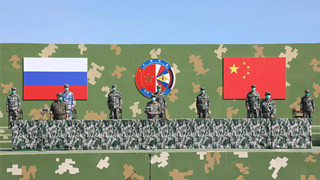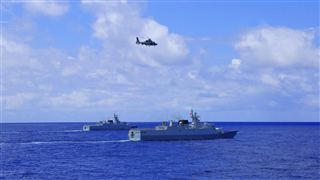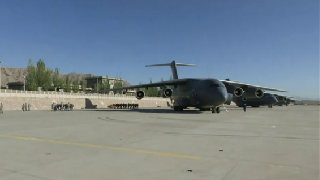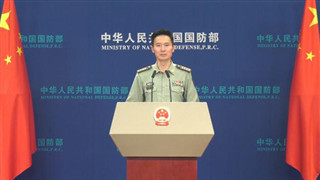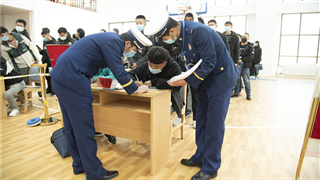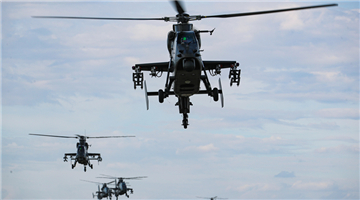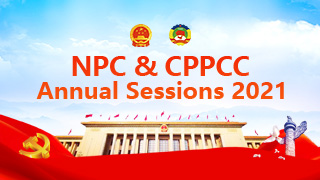郭丹
By Guo Dan
今年8月15日是日本战败投降76周年,日本政府像往年一样在位于东京的日本武道馆举行“全国战殁者追悼仪式”。日本首相菅义伟当天首次以首相身份在“全国战殁者追悼仪式”上致辞。他继承了前任安倍晋三的做法,在致辞中避而不谈日本对亚洲各国实施侵略战争和殖民统治的历史事实,更没有提到反省与道歉。至此,日本首相已连续9年未在“8·15”致辞中提及加害和反省。
August 15, 2021marks the 76th anniversary of Japan’s defeat and surrender in World War II. As usual, the Japanese government held a mourning ceremony in the Nippon Budokan, Tokyo. Japanese Prime Minister Yoshihide Suga addressed the ceremony for the first time since taking the office of prime miniser. However, Suga’s speech mainly followed that of his predecessor Shinzo Abe, making no reference to Japan’s war of aggression and colonization in Asia, let alone expressing remorse and apology. So far, Japanese prime ministers have removed any mention of aggression and remorse in their speeches at the annual memorial service for nine straight years.
分析人士指出,日本年年不忘纪念战争,但距离真实的战争历史却越来越远。政客喊着“和平”口号却忙于“拜鬼”,民众因为历史教育缺失变得无知。这些都再次折射出日本社会扭曲的历史观和政客虚伪丑陋的嘴脸。
Analysts pointed out that though Japan holds ceremonies to commemorate World War II every year, it has diverged farther and farther from the truth of wartime history. Some Japanese politicians mourned war criminals under the pretext of “preserving peace,” and the Japanese public became ignorant due to a lack of education on history. All of these again reflects the distorted view on history in the Japanese society and the “false, ugly color” of some Japanese politicians.
此外,数名内阁成员还参拜了供奉有二战甲级战犯牌位的靖国神社。菅义伟本人虽未参拜,但以“自民党总裁”名义送去了祭祀费。
In addition, several members of the Japanese Cabinet visited the Yasukuni Shrine, where World War II Class-A war criminals are honored. Though Yoshihide Suga didn’t visit the shrine personally, he still paid tribute as the president of Liberal Democratic Party of Japan (LDP).
中韩等遭受过日本侵略的亚洲国家已多次对日本政客参拜靖国神社表达不满和抗议。中国国防部13日就岸信夫参拜靖国神社表示,此事再次反映出日方对待侵略历史的错误态度和挑战战后国际秩序的险恶用心,中方要求日方认真反省侵略历史,时刻牢记历史教训,采取措施纠正错误,以实际行动取信于亚洲邻国和国际社会。
Asian countries once suffered Japanese aggression, including China and the ROK, have repeatedly expressed discontent and denouncement for Japanese politicians’ visits to the Yasukuni Shrine. On August 13, China’s Ministry of National Defense slamed Japanese Defense Minister Nobuo Kishi’s visit to the Yasukuni Shrine by saying that the visit once again reflects Japan’s wrong attitude towards its history of aggression and its sinister intention of challenging the post-war international order, and that China urges Japan to seriously reflect on its history of aggression, keep in mind the historical lessons, correct its mistakes and gain the trust of its Asian neighbors and the international community through concrete actions
不仅日本政客公然淡化、美化侵略历史,许多日本民众也严重缺乏对真实战争历史的认知,形成了扭曲的历史观。
Not only some Japanese politicians publicly downplay and even beautify their country’s history of aggression but many Japanese people are seriously lacking in knowledge of historical facts related to World War II, forming a distorted view of history.
今年8月6日和9日,日本广岛市和长崎市分别举行了原子弹轰炸纪念仪式。德国驻日使馆9日在社交媒体上发文,在对原子弹轰炸的死者表示哀悼的同时,指出日本遭到原子弹轰炸的“源头是德国和日本的民族主义和军国主义所引发的战争”。
On 6th and 9th of August, ceremonies were respectively held in Hiroshima and Nagasaki to commemorate the atomic bombings. The German Embassy in Japan posted an article on social media on August 9, which mourned victims of the atomic bombings and pointed out that the tragedies were sourced from the war triggered by nationalism and militarism in Germany and Japan.
此文一出立刻引起日本网民围攻。“怎么能把日本和德国纳粹相提并论?”“日本是被迫进行自卫战。”“日本发动战争的原因是美国对日本的经济封锁。”留言区的种种奇谈怪论令人咋舌。
However, the article was immediately flooded by criticisms from Japanese netizens. The comment section was packed with various ridiculous remarks such as “How dare you to liken Japan to Nazi Germany?” “Japan was forced to launch a self-defense war.”“Japan launched the war because it suffered US economic blockade.”
日本明治学院大学国际和平研究所研究员石田隆至表示,日本一直以来正当化和美化侵略战争,蔑视和歧视被侵略国家,这反映的是日本未能承认错误、未能惩罚侵略战争责任人、未能进行全社会的真正反省。
A research fellow at the International Peace Research Institute at Meiji Gakuin University noted that Japan has long attempted to justify and beautify its war of aggression, and scorned and discriminated against the countries it invaded, which demonstrates that Japan has failed in admitting its mistakes, punishing those responsible for the war of aggression, and carrying out true remorse across society.
石田指出,日本的学校教育也没有在形成正确史观上发挥作用。中小学历史课本对日本的侵略战争没有明确定性,关于加害历史的描述越来越少,学校还因授课时长限制几乎不教授近代史,通过学校教育学到的战争史除了“被空袭、被原子弹轰炸”的“被害”历史之外几乎什么也没有。像洪水一样泛滥的历史修正主义和蔑视亚洲国家的言论乘虚而入,对网络世代的年轻人产生了巨大影响。
He also pointed out that Japan’s school education fails to play a due role in helping students form a correct view of history. History textbooks in primary and secondary schools of Japan don’t clearly define the war launched by Japan as the aggression of other countries, and increasingly decrease content related to Japan’s aggression. Due to “limited school teaching hours,” modern history is almost skipped in history curriculums in Japanese primary and secondary schools. What Japanese students can learn about the history of World War II at school is very little, except for the “sufferings” of their country, such as “air raids and atomic bombings” by the US. Historical revisionism and comments scorning other Asian countries flood in Japan, exerting a profound influence on young people in the internet era.
尽管在历史认识上受到亚洲受害国和国际社会批评,但日本政客对此满不在乎,还兜售一套美化侵略历史的歪理。
Although their historical awareness has incurred criticism from Asian neighbors and the international community, Japanese politicians remain shameless and continue hyping sophistries that aim to beautify their history of aggression.
菅义伟在“8·15”致辞中将死于侵略战争的日军士兵描述为“担忧着祖国的未来、祈愿着家人的幸福而倒在战场上”的人,宣称日本现在的和平与繁荣是“建立在战殁者宝贵的生命和苦难的历史之上”。
In his address at the August 15 memorial service, Suga called Japanese soldiers who died in the war of aggression as “those who died on the battlefields while concerning the future of their motherland and praying for the wellbeing of their families” and said that Japan’s current peace and prosperity “is built on the precious lives of those died in the war and the nation’s history of sufferings.”
分析人士指出,日本政客一边将“守护和平”挂在嘴边,一边却把在侵略战争中死亡的士兵尊崇为“英灵”,这体现了其声称的“和平理念”的虚伪。
Analysts pointed out that Japanese politicians preach “safeguarding peace,” but at the same time revere Japanese soldiers who died in the war of aggression as “heroic martyrs,” which proves the falsity of the so-called “peace concept” they claimed.
这种虚伪在日本对待核武器的态度上也很明显。日本政府一直以“原子弹轰炸唯一受害国”自居,声称要在追求“无核武世界”方面发挥领导作用,但却以“安全威胁”为由拒绝签署众多无核国家参加的《禁止核武器条约》。广岛和长崎市长在今年的原子弹轰炸纪念仪式上均要求日本政府签署该条约,但菅义伟拒绝回应。
Such falsity is also embodied in Japan’s attitude towards nuclear weapons. The Japanese government has long declared itself as “the only victim of atomic bombings in the world,” and claimed that it is endeavoring to play a leading role in building a “world free of nuclear weapons.” However, under the pretext of “security threat”, Japan refuses to sign the Treaty on the Prohibition of Nuclear Weapons(TPNW) initiated by non-nuclear states. At this year’s ceremonies commemorating the nuclear bombings, both mayors of Hiroshima and Nagasaki requested the Japanese government to sign the treaty, but Suga refused to respond to this request.
石田隆至表示,追求“无核武世界”的表态只有在与民族主义、军国主义、侵略战争诀别后才会有分量。有着被原子弹轰炸的经历,却对加入《禁止核武器条约》态度消极,这凸显出日本政府的错乱。
The Japanese researcher from the Meiji Gakuin University pointed out that Japan’s voice to call for a “world free of nuclear weapons” will be taken seriously by other countries only when it completely bids farewell to nationalism, imperialism and the war of aggression. As a victim of atomic bombings, Japan shows a negative attitude towards joining the TPNW, which highlights the derangement of the Japanese government.
